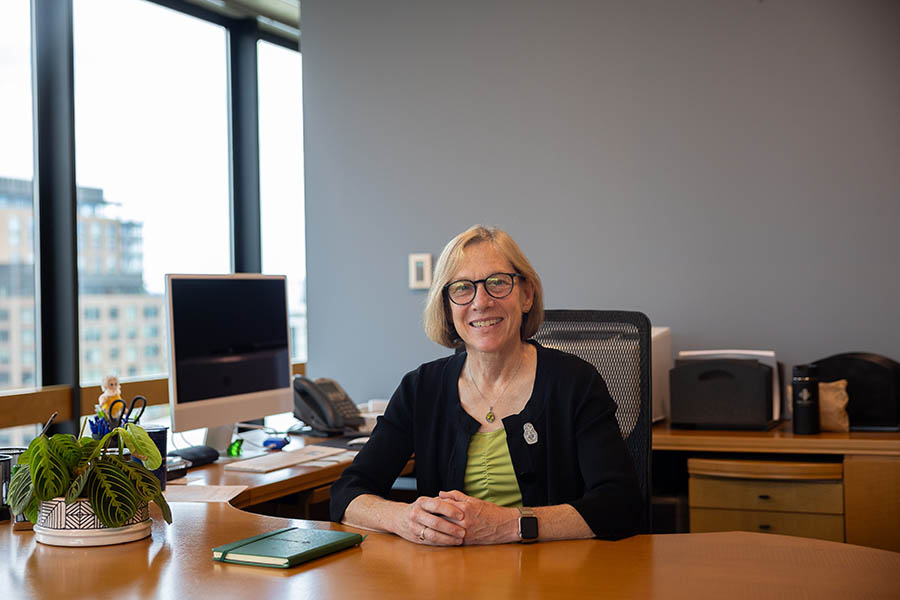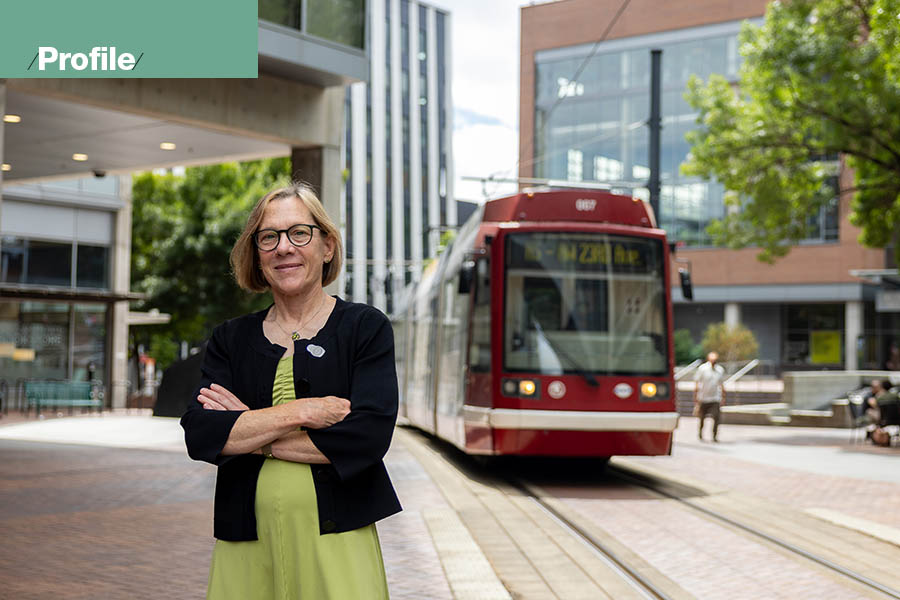Ann Cudd makes her debut this fall as Portland State’s president as the school faces
the headwinds of declining enrollment, rising tuition and administrative bloat. She’s optimistic the school can persevere — and help revive Portland’s embattled downtown.
As Ann Cudd made the jump from academia to university administration in 2008, she realized she was part of the problem.
Cudd became the associate dean for humanities for the University of Kansas in 2008 after spending 27 years as a philosophy professor. She says seeing the university operating model from the other side of the desk brought her face to face with the reality that institutions of higher education widen the economic gaps in society. She says the experience lit a fire in her to make college more affordable.
“I really felt a duty or a calling to work on affordability-access kinds of initiatives. Just helping students to afford an education was a great need,” says Cudd, who begins her first term as president of Portland State University this fall. “Many students are just not able to afford a great education, and yet a great education is really necessary for joining the middle class, or for coming up with the kind of innovative and creative ideas that our society really runs on.”
Raised by librarian-rancher parents on a horse farm in Ohio, Cudd says her parents’ love of literature and philosophy guided her down the path toward academia. She obtained her doctorate at the University of Pittsburgh — where she would later return to become provost — studying economics and political philosophy, with a specialization in feminist thought and theory.
As a philosopher, Cudd’s research focused on examining feminist concepts through rational choice theory — a decision-making school of thought pioneered by the capitalist philosopher-economist Adam Smith. Her first publications centered on how people, particularly women, make decisions rationally, strategically and collectively. She says her training as a philosopher helps her consider all the possible angles and outcomes of a decision while also considering the school’s moral and ethical responsibility.
“I am, after all, trained as a decision theorist, getting the data and having a good sense of what are the likely outcomes of a decision, what are the possible outcomes and what are the probabilities of each of those happening,” says Cudd. “Then also considering very deeply a principle’s perspective; that includes serving the city, opening doors of opportunity, being equitable, and doing everything with ethics and integrity. That’s the overall philosophy of decision-making that I have.”
At PSU Cudd will face falling enrollment; cuts to faculty and classes; and what the school’s own board chair describes as a bloated, decentralized administrative wing she is tasked with trimming. Cudd says her role as a president is to make decisions necessary to achieving her vision for the school: choices that emphasize affordability for students, foster a creative, team-centered learning environment, and bring in outside partners from the public and private sectors together to solve the city’s most persistent problems.
An active hiker, biker and runner, Cudd says she was drawn to PSU in part because of the opportunities for outdoor recreation in the area. She also admired the school’s mission of serving the city of Portland.
“It’s a creative, innovative city. I was a big fan of Portlandia, of course,” says Cudd. “And Portland State is so entwined in the whole culture and ethos of Portland.”
Cudd was also impressed by PSU’s affordability mission. Starting in the fall of 2023, PSU streamlined two of its financial aid packages to create a tuition-free degree program for students qualifying for the Federal Pell Grant. The PSU initiative is referred to as a “last dollar” program, meaning the school provides enough funds to ensure that the student does not have to pay tuition for their classes after a student’s federal and state financial aid is applied, rather than the school’s financial aid being applied first in the process.
Cudd says the PSU program goes even further than the Pell-matching measures she helped institute at Pittsburgh, which reduced the average debt burden of Pell-eligible students by $4,000 and grew headcount 4% one year.
Full-time enrollment at PSU dropped 11% between 2019 and 2021, costing the university $18 million. The decline in enrollment is part of a national trend — college headcount declined 8% nationally between 2019 and 2023, according to the U.S. Bureau of Labor Statistics. Enrollment at PSU dropped by 3.7% during the 2022-2023 academic year, according to university data. PSU tuition also rose by 3.6% in the 2022-23 school year, compared to the average national increase of 1.8% during the 2022-2023 academic year.
In June PSU’s Board of Trustees dipped into its reserves for $20 million to fund the school through the upcoming year and cut spending by 1.3% by reducing personnel costs by $14.8 million.
The school commissioned an operational review by Hillsboro-based Huron Consulting Group in 2021, which found the school functioned on a fragmented operating model. The report also found a fractured student-services department reporting to five separate vice presidents; minimal career growth opportunities for PSU students; and outsized administrative spending that “outweighs all student services, enrollment, and academic program support combined.”
Cudd says PSU’s tuition raises are part of a continuing decline after the college rates peaked during the Great Recession in 2011, and that the college is still affordable. When it comes to streamlining and consolidating functions at PSU, Cudd says she will be consulting the school’s departments and will study the culture, but that ultimately her decisions will be guided by the data collected by the Huron report — decisions that PSU board chair Benjamin Berry says have been kicked down the road by her predecessors.
Berry, who is in his first year as chair of the Board of Trustees, says Cudd will be expected to streamline the school’s administrative arm, which has become bloated over decades of indecision by former leadership.
“The reason we’re so decentralized at PSU is because various colleges and groups decided, ‘Well, we’re not getting it done through our administration. Let’s go ahead and hire these other people internal to the college, and then they’ll get it done,’” says Berry. “But by doing that, we are actually spending more money versus trying to standardize and consolidate.”
While Berry is optimistic about Cudd’s ability to lead the school, the decision to hire her also came amid increased tension between faculty unions and the Board of Trustees. In May the PSU chapter of the American Association of University Professors published a blog post highlighting the impact of budget cuts on students and faculty, and mentioning a slide from an April budget committee meeting that proposed allocating a maximum of $10 million of its $20 million dip into its reserve funds to allow for flexibility to new university leadership — what the union described as a “startup fund” for Cudd.
Emily Ford, president of AAUP’s PSU chapter, says the proposal, which the union’s blog post said was an example of “moral bankruptcy” on the part of the board, caused an outcry because of the pain faculty and staff are experiencing due to budget cuts.
The school released an official response to questions about how it allocated finances, detailing its spending and ensuring trustees did not vote on the topic of a discretionary fund for President Cudd, nor was any such fund earmarked or established.
Ford says even though that proposal didn’t advance, faculty and staff haven’t seen more funding. She expressed concerns about disciplines and majors being trimmed down by the college, including the world languages department, which saw its Chinese major eliminated in 2021. This year students in the school’s political science department launched a petition to save the job of a political science professor.
“Because we spoke up clearly and loudly, I think the board responded, and one of their responses was to just eliminate any mention of flexibility or discretionary money. Unfortunately, people are still not able to graduate, classes are canceled and jobs are cut,” says Ford, who adds that the school’s cost-saving measures should focus on the bloat in upper management identified in the Huron report rather than the faculty and staff. According to Ford, academic advisors at the School of Business Pathways have reported caseloads three times the national average, while advisors in engineering, computer science, and math manage loads five times the national average — all while one-third of managers at PSU oversee fewer than three direct reports, according to the Huron data.
Erica Thomas, an adjunct art professor at PSU and political action chair of the Portland State University Faculty Association, which represents adjunct faculty at PSU, describes the cuts as a disinvestment in the school.
“If you cancel a class and a student has to go somewhere else to take it, or if you raise the class sizes and give them a poorer-quality education, that’s probably the worst possible way you could respond to a slight enrollment dip,” Thomas tells Oregon Business.

As a former professor herself, Cudd says she understands the squeeze facing faculty. She’s also agreed to quarterly meeting with union representatives to maintain dialogue on issues facing the school. Ford says quarterly meetings with the president were already the norm and that she is hoping to add more frequent meetings to the president’s schedule.
Cudd says the trend toward increased adjunct workloads is not necessarily a great thing, but that adjuncts who also work in their fields of study can provide students with an insider perspective. She says one role of her administration will be to bring the private sector into the classroom to create research partnerships. She says these arrangements are especially motivating for students, as it can prepare them to hit the ground running toward a career upon graduation, sometimes with intellectual property all their own.
“This was something that happened at Pittsburgh, especially in computer science,” Cudd says. “Sometimes it would be a small startup company, but sometimes it was Google. They would agree to set up here and say, ‘Here are a bunch of challenges we have right now that seem to connect with your course. Can you have your students work on these things?’ Then you have some kind of agreement about how you’re going to share the intellectual property, because you want the students to own their intellectual property if it’s successful.”
Cudd says programs that give students a familiarity with data science — as well as programs that emphasize collaboration and team-building in a multicultural setting — will be important pillars of the PSU experience precisely because they relate to the needs of the private sector. She also emphasizes the importance of PSU’s arts programs, saying she expects the College of Arts to play a key role in building up the arts and entertainment sector, with the hopes of revitalizing Portland’s struggling downtown, where PSU is situated.
She also says the school’s Homelessness Research & Action Collaborative — which has already collaborated with Health Share of Oregon and Oregon Health & Science University to generate funded homelessness research — should work alongside the city to generate better, evidence-based homelessness responses. It’s a vision that plays to PSU’s strengths: The school produces 60% of the state’s licensed social workers, according to state licensure data, and Oregon is among the leading states showing an increased demand for social workers, according to the U.S. Department of Labor, which estimates a 15% growth in social work positions in the state by 2028.
Cudd also plans for the PSU School of Public Health to continue to collaborate with Oregon Health & Science University on programming, and wants to ensure the semiconductor industry continues to build in Portland, citing the $38.2 billion available in direct federal funding from the CHIPS and Science Act.
“I think our angle will be urban research and it will be community-engaged research. We have one of the only urban engineering schools in the state. One of the things that we’re good at is smart grids, and that’s a really critical need to creating smart cities and solving the grand challenge of faster computing,” she says.
Through her rise through the ranks of university administration, Cudd says she still thinks of herself as a professor and academic first. She says she has a personal interest in making PSU a place where students and staff get the most out of their time at the college. And she says she has a vested interest in keeping the liberal arts alive at the school.
“I certainly hope that one day I can retire from the presidency when Portland State is flourishing, and I can come back and be a philosophy professor again,” says Cudd.
Click here to subscribe to Oregon Business.






